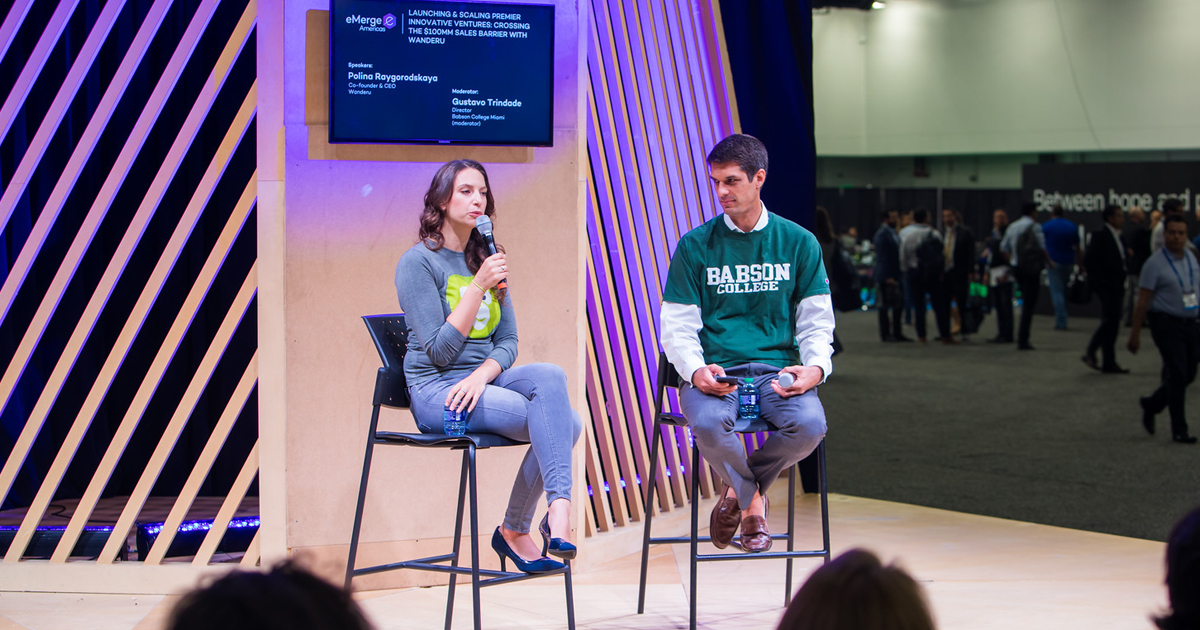How Solving 1 Problem Led to Millions in Revenue

To Polina Raygorodskaya ’08, creating a successful product isn’t about building a shiny interface or having a prosperous advertising campaign.
Rather, it’s about solving a problem and creating a positive experience that will resonate with users.
Raygorodskaya fulfilled both objectives when she established Wanderu, a bus, train, and ferry search service. She shared the story of how she scaled up her company, which in six years surpassed $100 million in revenue, with Director of Babson Miami Gustavo Trindade MBA’17 at eMerge Americas in Miami, a “convening of global enterprises, leading startups and government leaders focused on innovative digital solutions transforming industries.”
Miami made a great setting for eMerge. The city’s startup community is booming, and several key players are helping companies continue to scale. During the past seven years, the Knight Foundation has invested more than $30 million in growing the city’s startup community by attracting investors and talent, including Babson’s Women Innovating Now (WIN)Lab® to accelerate women’s businesses.
Babson hoped to play a vital role in Miami’s startup community growth when it decided to expand its offerings in Florida in 2017, where thousands of alumni live, work, and visit. The College offers several graduate and executive education programs to entrepreneurs in Florida and Latin America.
A search service inspired by a cross country trip
At eMerge Americas, Raygorodskaya discussed the advancements of Wanderu with Miami’s entrepreneurs. She said the thought of creating a joint bus and train travel search service arose in 2011, when she and a group of friends planned a trip from New York to California entirely through rideshares to raise awareness for national parks and forests.
“We wanted to do something crazy to get people to pay attention,” Raygorodskaya said.
The trip took the group from New York to Washington,D.C.,and then rural Virginia, where it became stranded in New Castle, a town of about 150 people in the George Washington and Jefferson National Forest, after a planned rideshare canceled.
The group searched to no avail for buses and trains that stopped in the immediate area and eventually settled on renting a car. Raygorodskaya said the group was frustrated at the time about the lack of available services to plan trips from one destination to another.
“The passion to solve this problem overtook me,” she said.
Through research, Raygorodskaya discovered more people travel by bus and train in the United States than by flying. She also learned there were more options in traveling by bus instead of through the air.
Filling a void where there was a need
With no clear central way to book bus and train travel, Raygorodskaya established Wanderu in 2013; it’s now the largest service of its kind in North America. Only bus service was first rolled out in the Northeast, and the company later expanded to other regions of the United States, as well as Mexico, Canada, and Europe.
Train and ferry search services were added along the way, and the company plans to offer flight search service in the near future.
Raygorodskaya said building the right team was critical to the immediate success of the company. “Wanderu would not be where it is today if it wasn’t for the amazing team that works for me,” said Raygorodskaya, who will also be receiving an honorary degree at Centennial Commencement. “We have an incredible set of engineers, people doing marketing, PR, business operations.”
Raygorodskaya said she overcame the challenge of trying to raise funding as a woman.
“Investors invest in people that are like them,” she said. “When the venture capital industry is more than 90 percent male, they invest in predominantly males.
“All that does is motivate me to work that much harder,” Raygorodskaya added.
Wanderu became profitable in 2017, and despite all of its early success, Raygorodskaya believes the company has room for additional growth.
“The way that we look at it is, how can we continue to solve the problem?” she said.




